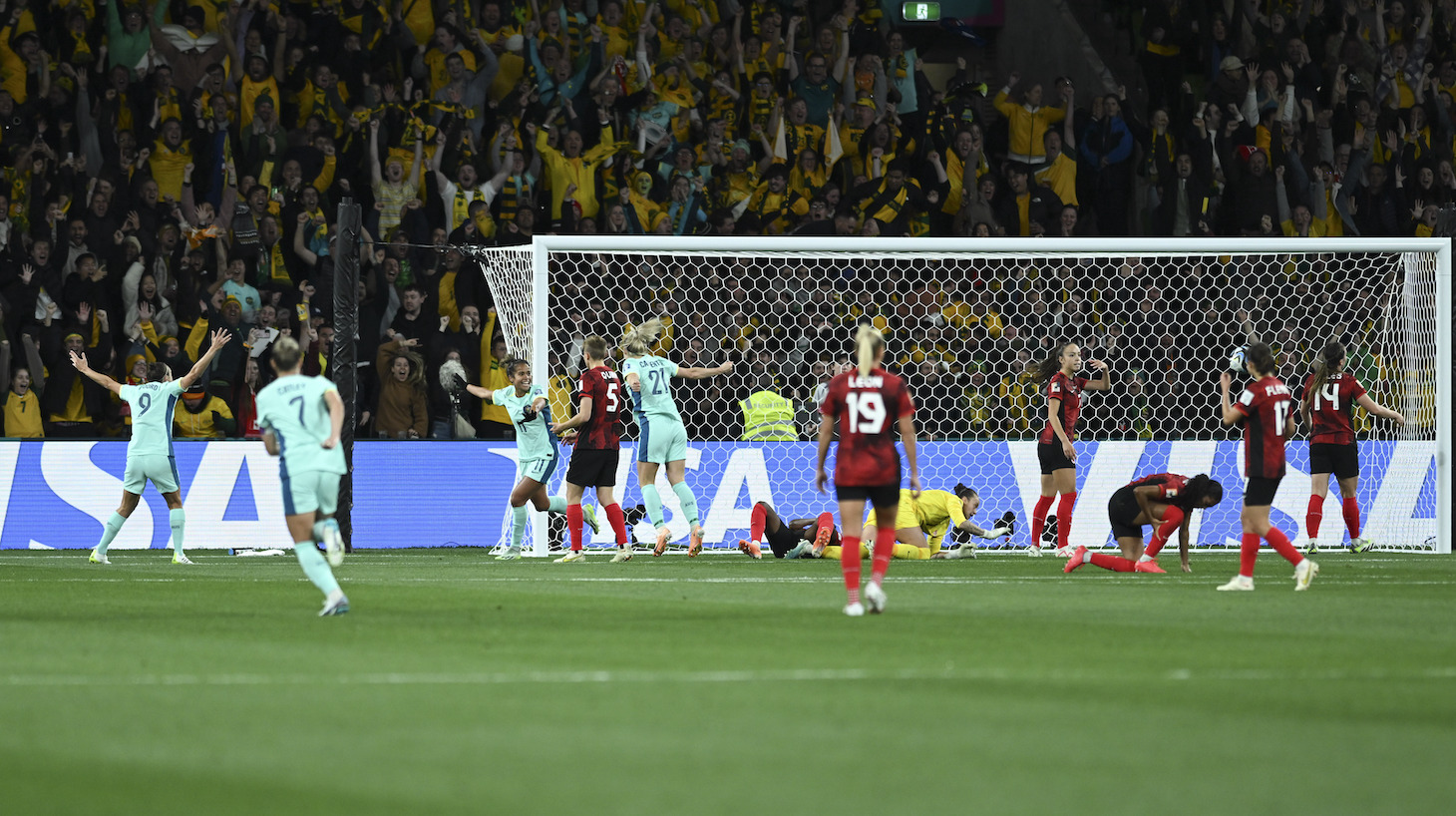The last round of the World Cup's group stage, compared to the rest of the tournament, usually kind of sucks. The results of the first two rounds often kill the intrigue in most of the groups, leaving a bunch of dead rubber matches no one really cares about. Even more injuriously, the (admittedly necessary) scourge of simultaneous kickoffs means the very best part of the group stage—the gloriously punishing torrent of daily matches—is halved. Especially at this World Cup, where even the most deranged soccer sickos in America find it impossible to watch as much of the action live as we'd like due to the time zone differences, we must treasure the rare group-ending matches that offer some combination of real stakes and compelling teams.
Monday's double-header, Japan vs. Spain and Canada vs. Australia, looked to include two of the most attractive matches left in the group stage. The first match, between Japan and Spain, pitted two of this tournament's standout performers against one another. Both teams had already punched their ticket to the knockout round, and there isn't a huge difference between finishing first or second in the group (the winner would face Switzerland and the loser Norway, neither all that scary a prospect). But the quality of the teams and the impressiveness of their first two matches gave Monday's game the air of a potential semifinal. Canada vs. Australia, in turn, looked interesting less because of the greatness of the teams (both of which have been mediocre so far) and more because of the stakes at play and the pressure on both to deliver. Canada and Australia each entered the tournament believing they had what it takes to be world champions; each came into Monday's game threatened with early elimination and aiming to avert disaster.
So this one day gave us two matches with four very good teams and high, albeit differing, stakes. But somehow, instead of the intense and competitive contests you might've expected, we ended up with two laughers that featured the same lopsided scoreline.
Let's start with the first match of the day, Japan vs. Spain. Both teams' prior experience Down Under consisted of utterly demolishing their two other group-mates. Those performances cemented Japan and Spain as legitimate title hopefuls. Spain whomped Costa Rica and Zambia by one goal more than Japan managed (8-0 to 7-0), though Japan had probably played better comprehensive games. Still, even in light of Japan's marginally better performance thus far, no one would've expected the Japanese to flatten the Spaniards, 4-0, the way they eventually did.
But unexpected isn't the same as shocking, and you could see in Spain's previous matches the exact weaknesses Japan exploited to such devastating effect: the defensive frailty, the attacking profligacy, the vulnerability to counters, the difficulty creating clear chances against tight defenses. Japan played in a deep and extremely compact defensive block that sealed up all the central spaces Spain usually thrives in. Without those pockets of space inside which the likes of Aitana Bonmatí, Alexia Putellas, Jenni Hermoso, and Mariona Caldentey wreak so much havoc, and unable to create that space by teasing apart Japan's block, Spain's dominance of the ball (they had 77 percent of the possession) was completely impotent.
In the other direction, after every Spanish turnover Japan quickly worked the ball out to the wings, where Spain's full backs, pushed high up the pitch, left acres of space behind. Any given successful pass out to wing back Jun Endo practically gave Japan an open highway leading deep into Spanish territory. With Endo streaking down the wing, and Riko Ueki and Hinata Miyazawa bombing down the center, Japan easily and repeatedly overcame Spain's central defense.
That the Japanese scored with each of their first three shots of the match, giving them an insurmountable 3-0 lead by halftime, was less a matter of luck and more a reflection of the incredible danger Japan created with each trip across the halfway line. Each successive Japanese goal landed like a haymaker. The first goal rattled Spain, the second thoroughly discombobulated them, and the third might as well have been the knockout blow. Spain never looked like getting back into the match. When Mina Tanaka's twisting hips hoodwinked Spain's backline before she slammed the final goal into the back of the net in the 82nd minute, it meant little to a match that had long been finished as a contest but did add to the magnitude of Japan's achievement and Spain's humiliation. Four to zero is a serious ass-kicking.
If Japan-Spain was a duel between two teams teams with golden dreams looking to make a statement about their future in the tournament, then the stakes of Canada-Australia were much more immediate; those two were at serious risk of seeing their World Cup hopes dashed right then and there, outcomes far more embarrassing than even the worst beat-down Spain could've suffered. But even with both teams having everything to play for, the match, like Japan-Spain before it, was surprisingly one-sided, as Australia ran roughshod over Canada, 4-0.
The day's second big blowout even resembled the first one in some funny ways. Canada, like Spain, had most of the ball (61 percent) and yet none of the match's momentum. Australia, like Japan, put the ball in the back of the net three times before halftime, and though the Matildas had one of those goals ruled out after replay, their 2-0 halftime lead was every bit as match-killing as Japan's 3-0. Like Jun Endo, Caitlin Foord was an unstoppable force down the left wing, and any pass out to her flank was basically a trampoline that catapulted the Aussies directly into Canada's penalty area. Canada, like Spain, had no clue how to get back into the match, and both 4-0 scorelines were as just as they were embarrassing.
The hype ahead of Monday's two matches might have been similar, and the results identical, but the takeaways for each team are much different. After that showing, we can say definitively that Japan has been the best team at the World Cup thus far. They may have come into the tournament as dark horses to win, but they must now be considered one of the teams best equipped to lift the trophy. They are versatile (all three wins have featured substantial tactical and personnel tweaks), deep, well-coached, confident, and in great form. Australia, meanwhile, still doesn't look like a real contender even after Monday's win. This is no criticism: The Aussies' title hopes were always tied directly to the feet of superstar striker Sam Kerr, who is recovering from an injury suffered on the eve of the tournament and hasn't yet played a minute. Australia's comprehensive victory over Canada, and the spot atop the group it earned them, should give the team a much-needed jolt of confidence that should serve them well whether or not Kerr is ready to play a big role in the round of 16. Still, if the Matildas are to go really far in this tournament, it'll only happen if Kerr can lead them there.
But the main two takeaways to me from Monday's matches are about Spain and Canada. Like some of my colleagues, I am no fan of Canada's national team, and so I took pleasure in watching them get booted from the tournament after playing like trash. However, the schadenfreude I feel at their expense is tempered a bit by the team's terrible relationship with the Canadian Soccer Association.
It is true that Canada is almost always a boring team, that it lucked into gold at the Olympics last go-round, that it deserved its unceremonious ouster of this World Cup, and that for those reasons it is plenty deserving of all the mockery presently coming its way. However, it is also true that playing under the pall of Canada Soccer's shittiness probably had some effect on the team's play, and I can't in good conscience ding the players too hard for that, not when the true stakes of this sport, at this World Cup and far beyond, consist of battles like the one the players are waging against their federation. For that reason, I almost feel bad for how happy I felt seeing them eat a big plate of shit on the world stage. Emphasis on almost.
Spain's situation is different. I've loved watching Japan play at this tournament, and today's performance was about as masterful as they come, so I was quite entertained seeing Japan swing the ax with abandon. But I took no particular joy in the fact that it was Spain on the other end. I've had a particular affinity for the Spanish national team going back to the 2015 World Cup, when I was charmed by their attractive style of play, even in spite of the team's poor results. In the same way that I love the present Brazil team for its recognizably Brazilian style of play, I love how Spain has long looked and played exactly like a Spain team.
In Spanish soccer I can see a vision of the sport's future: the bonds of a country's soccer tradition and infrastructure strengthened across the gender divide; rising tactical, technical, and physical standards in the women's game that bring it closer to the men's; men's and women's soccer at club and international levels regarded as mutually reinforcing rather than as rivals or strangers. Watching Barcelona Femení ably and proudly carry the torch for what it means to be FC Barcelona, and to do so to wild fanfare, all while the men's team has gone to hell, has been eye-opening. The opportunity this Spain team has to pull off something similar at the national level is incredibly exciting. And so it is a huge bummer to see Spain fail like they did against Japan, especially when much of it is so preventable.
I don't think it's much of an overstatement to attribute most if not all of Spain's loss to manager Jorge Vilda. That Spain looked completely unprepared for Japan's eminently foreseeable tactical setup is on the manager. That Spain did nothing to stop the bleeding while Japan was playing them off the park is on the manager. That Spain has routinely been victimized by counter-attacking teams for years due to the height at which their full backs play is on the manager. That Spain got terrible performances out of center back Rocío Gálvez, defensive midfielder Teresa Abelleira, and goalkeeper Misa Rodríguez—while three of the country's very best players (center back Mapi León, defensive midfielder Patri Guijarro, and goalkeeper Sandra Paños) are back home in Spain, because the three of them chose to boycott the team, due in large part to Vilda's incompetence—is on the manager, and on the Spanish federation for backing him. That the federation decided to back Vilda—who has never performed well in a tournament despite having maybe the most talented roster in the world—instead of listening to the great, highly decorated players who asked that the managerial position be held to higher standards, is an unforgivable black mark on the federation.
Like Albert said in his Spain preview, all of this makes it difficult to know how to feel about this Spain team. On one hand, the players are great and ridiculously cool, and so it would be cool if they did well. On the other, the federation is a clown show, and so it would be cool if it received the comeuppance it deserves when its braindead decision-making is exposed to the world.
Losing to Japan doesn't mean Spain won't win the World Cup, though the manner of Monday's loss and the manager's seeming inability to patch up the team's glaring, long-standing weaknesses would imply that the Spaniards end yet another tournament in disappointment. Where Canada's fate makes me want to laugh at first and then, when I think more about it, makes me almost want to cry, with Spain it's the other way around.






